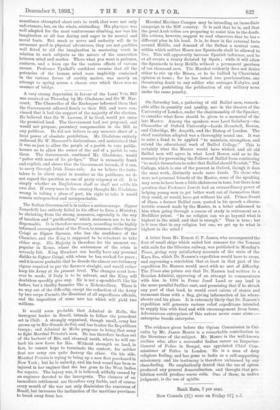On Saturday last, a gathering of old Balliol men, remark-
able alike in quantity and quality, met in the theatre of the University of London, under the chairmanship of the Speaker, to consider what form should be given to a memorial of the late Master. Among the speakers were Lord Salisbury—the Chancellor of Oxford University—Lords Herschell, Bowen, and Coleridge, Mr. Asquith, and the Bishop of London. The chief resolution adopted was a thoroughly sound one. It was to raise a fund to be applied "to maintain, strengthen, and extend the educational work of Balliol College." This is certainly what the Master would have wished, and all old Balliol men will agree in what Lord Bowen said as to the necessity for preventing the Fellows of Balliol from continuing "to mulct themselves in order that Balliol should flourish." The College, which is one of the poorest in Oxford, though it does the most work, distinctly needs more funds. To those who were not personal friends of the Master, some of the speaking may seem to have been a little idolatrous in tone, but there is no question that Professor Jowett had an extraordinary power of helping young men to get better work out of themselves than they could, or would, have got without his aid. Prince Svasti of Siam, a former Balliol man, quoted in his speech a charac- teristic remark made by the Master, in a letter addressed to him when going through a course of study in retirement as a Buddhist priest. "In no religion can we go beyond what is highest in the mind, and that is enough." That is true ; but is it true that in any religion but one, we get up to what is highest in the mind P






































 Previous page
Previous page